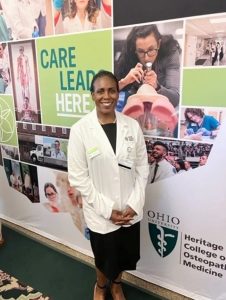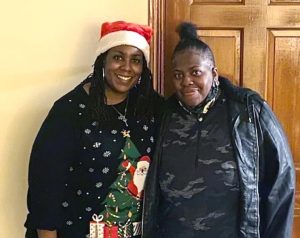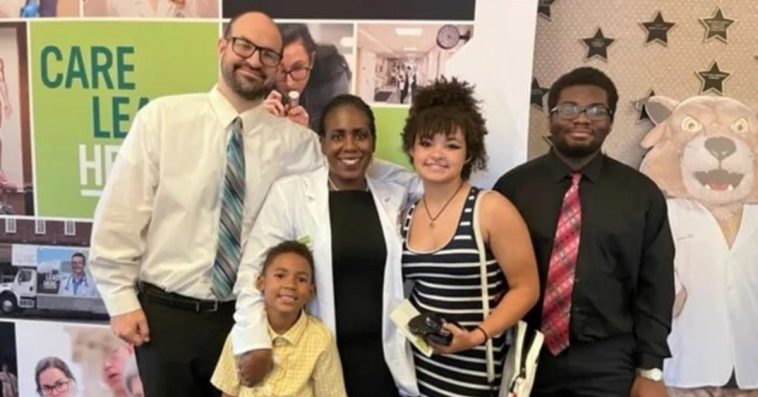Shamone Gore Panter’s pregnant niece called her at the height of the coronavirus pandemic to inquire about the COVID-19 vaccine. The expecting mother had been given inaccurate information, so she thought her aunt, a research scholar at Cleveland Clinic, could ease her concerns.
Both women’s lives were changed by their conversation. After the niece received her vaccination, Gore Panter, a mother of four, had to rethink her job choice.
“I thought that this is what I should be doing every day. The Cleveland resident, 43, said to TODAY.com, “I want to attend medical school. “I wasn’t sure of my destination. I simply knew I had to do it.

Shamone Gore Panter, pictured on the right, claims that being a non-traditional medical student is easier for her because of the support of her husband and family | Photo Credits – Shamone Gore Panter
Gore Panter had considered enrolling in medical school back in 2007. The Medical College Admission Test (MCAT), a lengthy standardized test required for admission to medical school, terrified the young mom and student.
Alternatively, she went back to school for a doctorate and started studying cardiovascular genetics at Cleveland Clinic while working as an assistant lecturer at Cleveland State University.
Over the years, she noticed how critical it was for Black patients to consult with Black doctors to address their “justified mistrust” of the medical system.
“It might be me,” she claims to have realized. “I might not be able to address all the issues, but sometimes seeing someone who looks like you gives you at least a foot in the door to perhaps attempt to talk to them and give them knowledge so they might be able to take better care of their health,” she says.
Gore Panter took a practice MCAT exam with the condition that if she scored higher than 500, she would take the actual exam and apply to medical schools. This helped Gore overcome her MCAT fear.
In fact, she achieved that objective, took the actual MCAT, applied to, and was accepted into, a program that is a collaboration between Ohio University and the Cleveland Clinic.
In this program, students who are interested in family practice can finish medical school in three years. Gore Panter expects to graduate in 2025.
“It is an exhausting three years because we do the same thing as everyone else but then with the added stuff on top,” she claims. We have weekly patient visits. The fact that it enables us to reinforce what we are learning in class makes that portion of the exercise incredibly beneficial.

It has been difficult for her to balance work and family obligations with her studies, but her husband supports her.
“My husband is incredibly supportive, which is quite helpful. Nevertheless, there is familial support, she adds. I simply strive to be very organized.
After eating dinner with her family, when she gets home from school, she makes the lunches for the following day. In order to ensure that she has little to do before leaving the house, she even spreads out everyone’s clothes.
She continues, “Then the morning is done, and I can do a little studying, just take time with the kids and the husband.” Even though I’m not as available as I once was, I still try to carve out some time each day.
Her three other children are ages 20, 19, and 17, and her youngest is seven. Due to their hectic schedules at work and in their social life, the oldest children are rarely home.
“If they have nothing planned, I might see them during the weekend. I thus just slightly notice them. Yet, I’m still texting everyone, she claims. No matter what I’m doing, whether I see them in person or not, I try to keep up some sort of conversation with everyone.
Gore Panter admits that balancing medical school and parenthood can be challenging at times, but she is confident that what she is doing has the potential to profoundly change people’s lives.
Her belief was strengthened by seeing Shan, her younger sister, in the battle to have access to quality healthcare.
Gore Panter was frequently worried that her sister’s doctors were not constantly monitoring her heart health.
After that, Shan passed away from heart disease just before the start of medical school orientation. The sisters were aware of this risk factor because their mother, Jackie, had died suddenly at 41 from a fatal heart attack.
Gore Panter says, “It’s really frustrating.” “You need to find a decent family doctor.”

In the end, Gore Panter chose to specialize in family medicine because she thinks patients open up to them the most.
“Your family doctor, primary care provider, or pediatrician is the person with whom you should establish a relationship, according to her. “Having the chance to develop that relationship makes a tremendous difference because that is the person you trust, the one whose advice you are more ready to take,” she says.
She believes that it is never too late to pursue your dreams, especially if you are returning to medical school in your 40s.
“It makes no difference how old you are. Go try and do it if you’re still alive, Gore Panter says. If you don’t even try, that could be a big regret.
We hope this story will give you a boost to accomplish your dreams no matter what your age is.
What do you think after reading this motivational story of Gore Panter? Did you have a dream that you gave up just because of your age? Please let us know in the comments, and don’t forget to spread the news so that we can hear from more people.



This post has reinforced my belief in the power of learning from others.